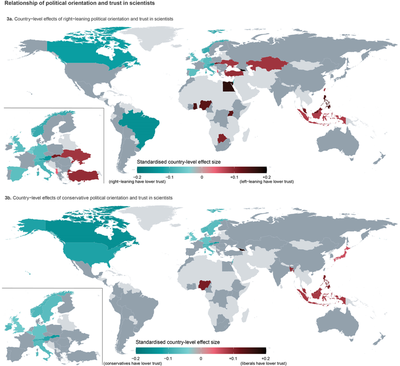Trust in scientists and their role in society across 68 countries
This large-scale collaborative study analyzes the public trust in scientsts in 68 countries worldwide, predictors and correlates of trust, cross-national and cross-cultural variation, as well as public perceptions of the role of science in society and policy-making.
Abstract
Scientific information is crucial for evidence-based decision-making. Public trust in scientists can help decision-makers act based on the best available evidence, especially during crises. However, in recent years the epistemic authority of science has been challenged, causing concerns about low public trust in scientists. We interrogated these concerns with a pre-registered 68-country survey of 71,922 respondents and find that in most countries, a majority of the public trust scientists and think that scientists should be more engaged in policymaking. We find variations between and within countries, which we explain with individual- and country-level variables, including political orientation. While we do not find widespread lack of trust in scientists, we cannot discount the concern that lack of trust in scientists by even a small minority may affect considerations of scientific evidence in policymaking. These findings have implications for scientists and policymakers seeking to maintain and increase trust in scientists.

Figure 3: Relationship of political orientation and trust in scientists
___________________________________________________________
Please cite as: Cologna, V., Mede, N. G., Berger, S., Besley, J., Brick, C., Joubert, M., Maibach, E. W., Mihelj, S., Oreskes, N., Schäfer, M. S., van der Linden, S., Abdul Aziz, N. I., Abdulsalam, S., Abu Shamsi, N., Aczel, B., Adinugroho, I., Alabrese, E., Aldoh, A., Alfano, M., . . . Zwaan, R. A. (2024). Trust in scientists and their role in society across 68 countries. Preprint. https://doi.org/10.31219/osf.io/6ay7s
Link to preprint: https://doi.org/10.31219/osf.io/6ay7s
News reporting: E.g., Nature News and Spektrum (German)
Social media: Post on X